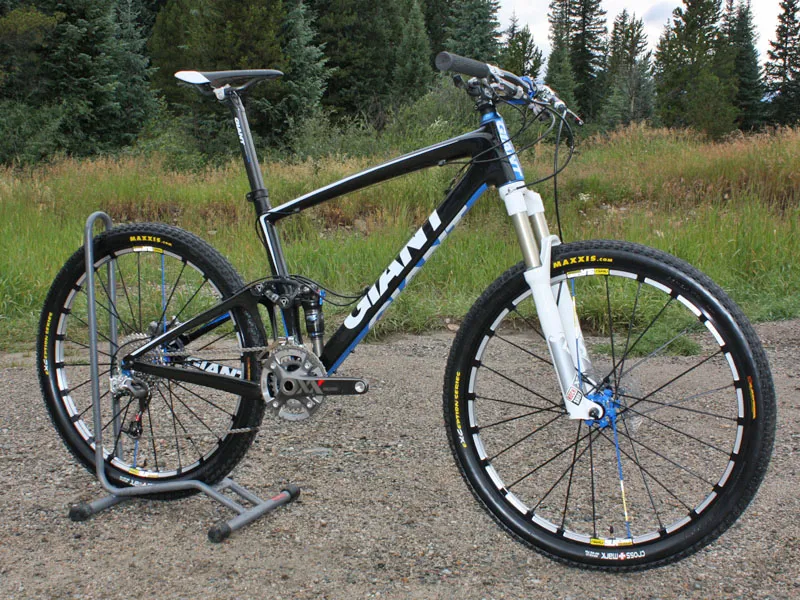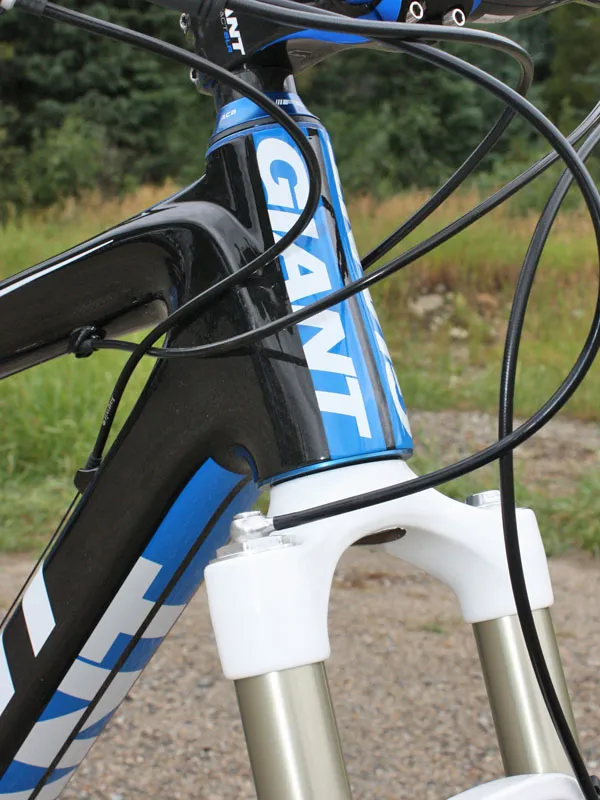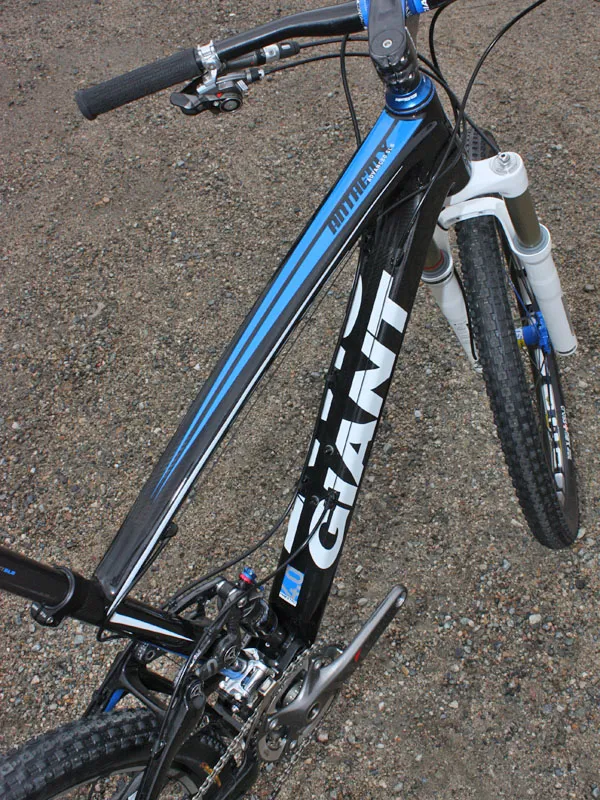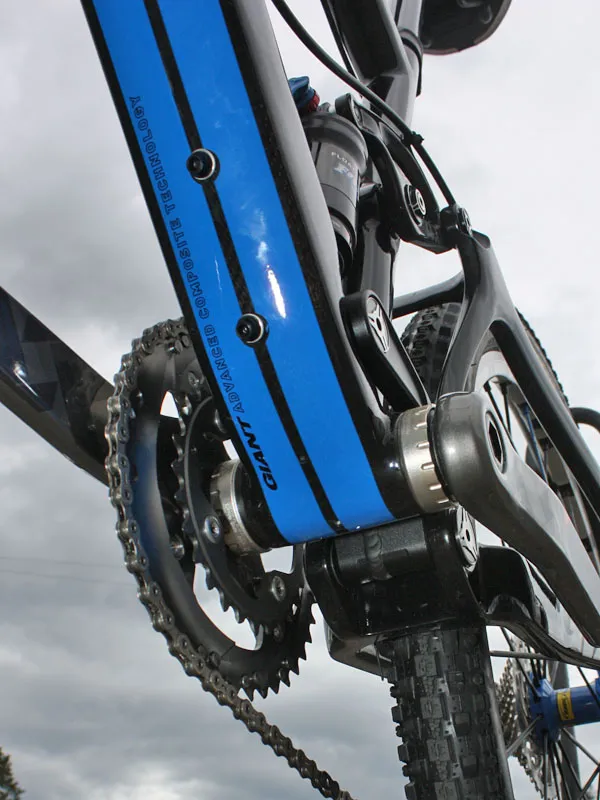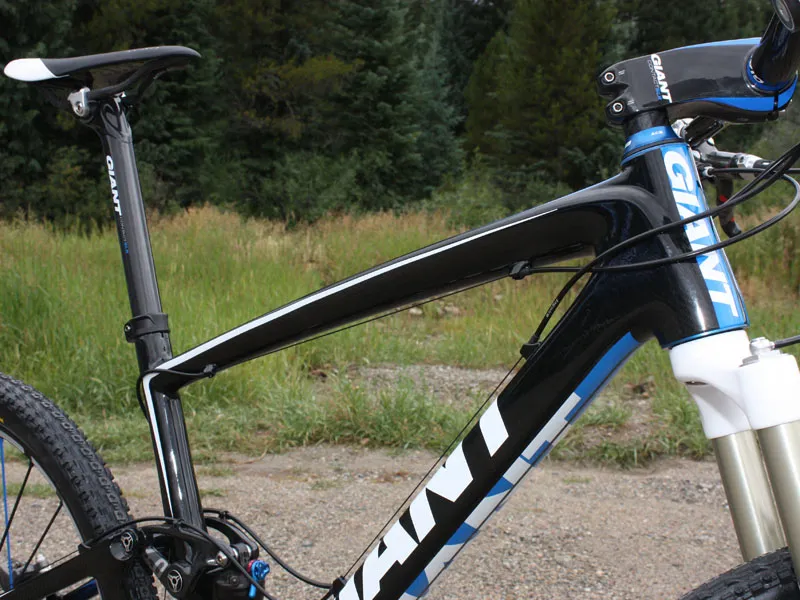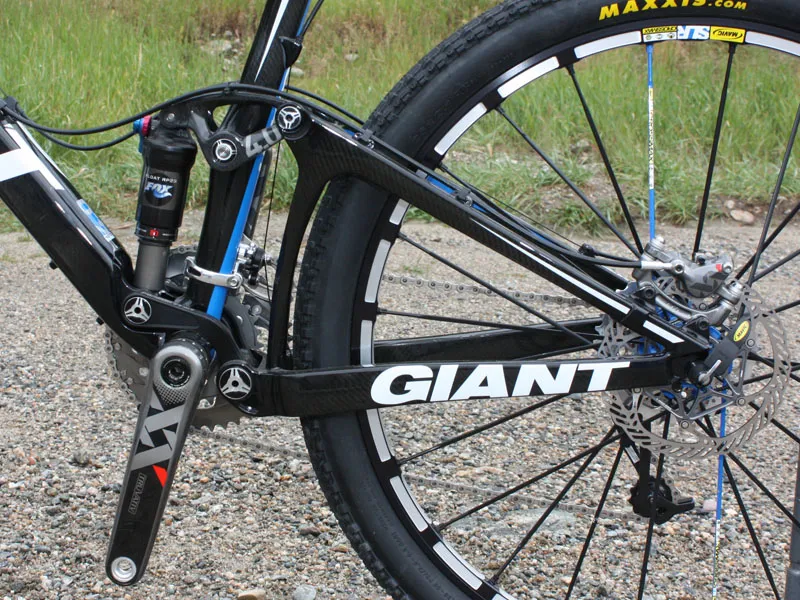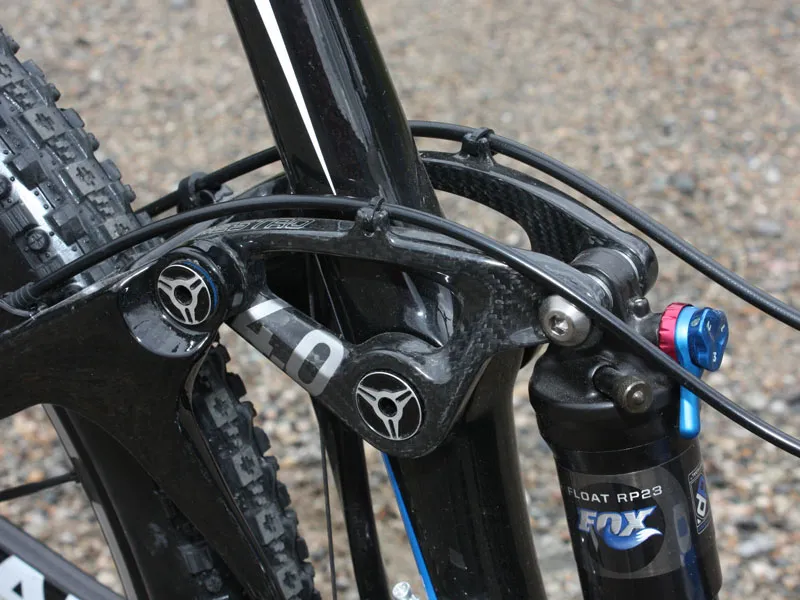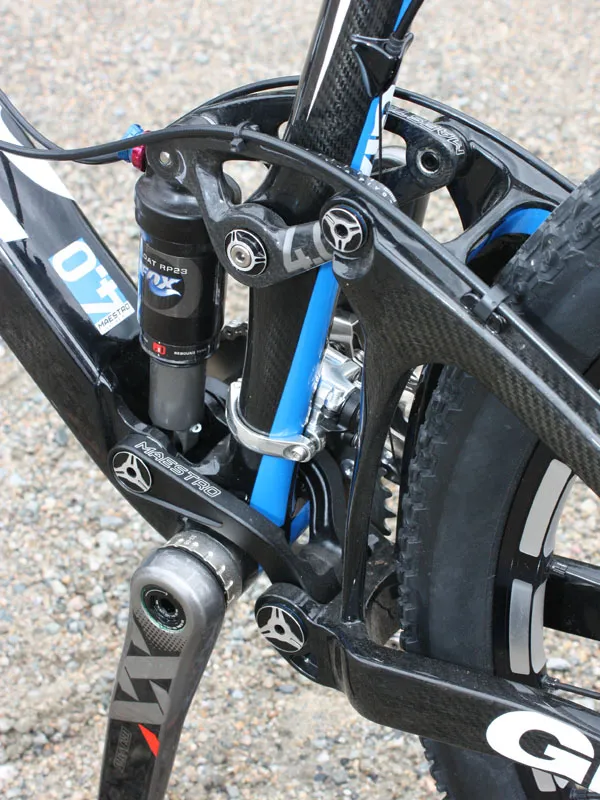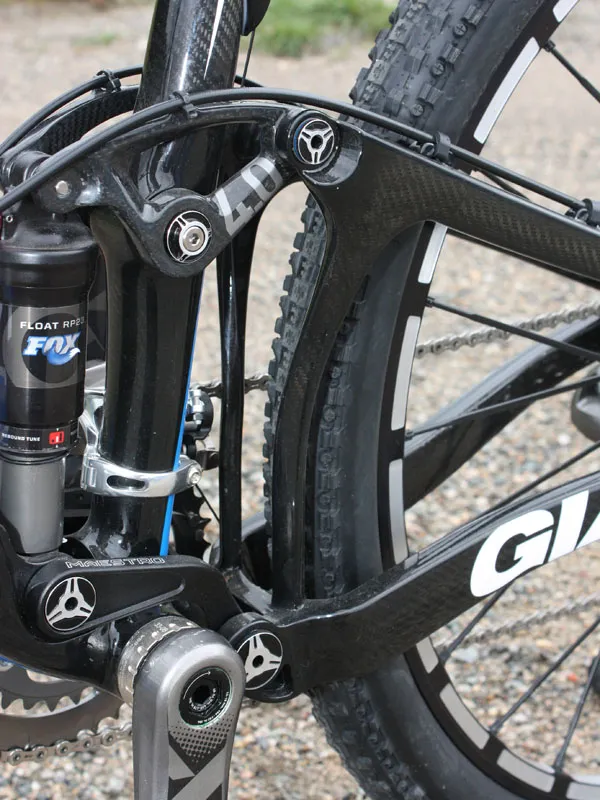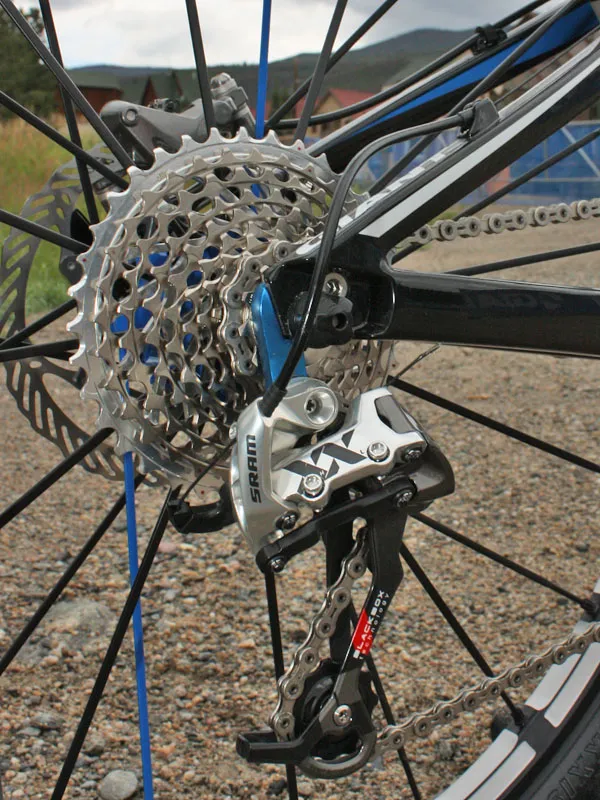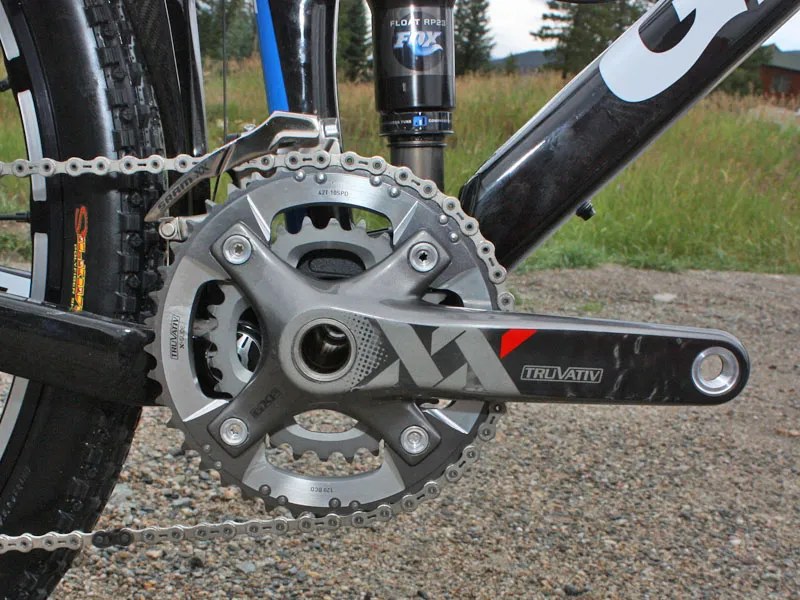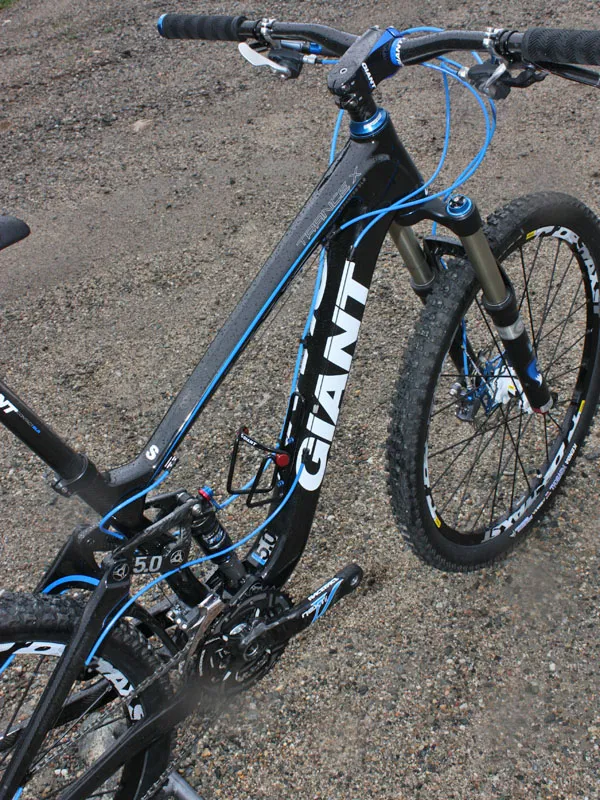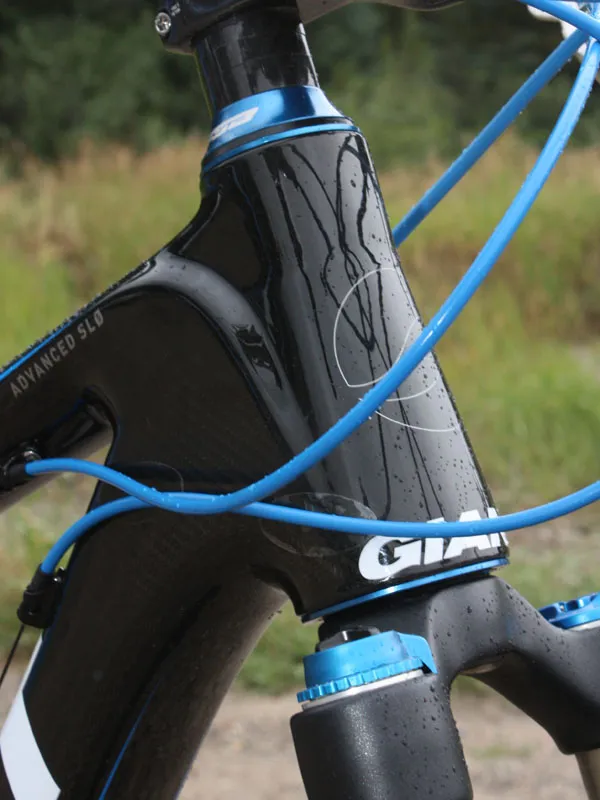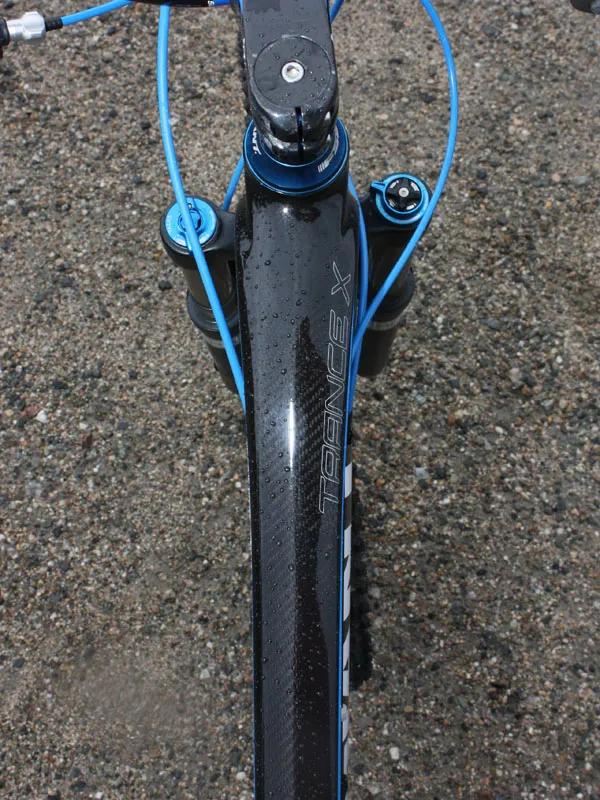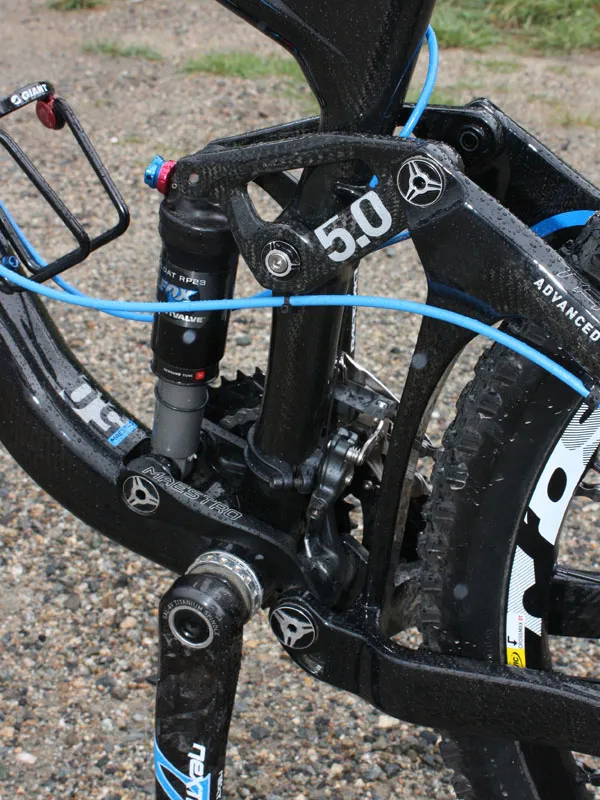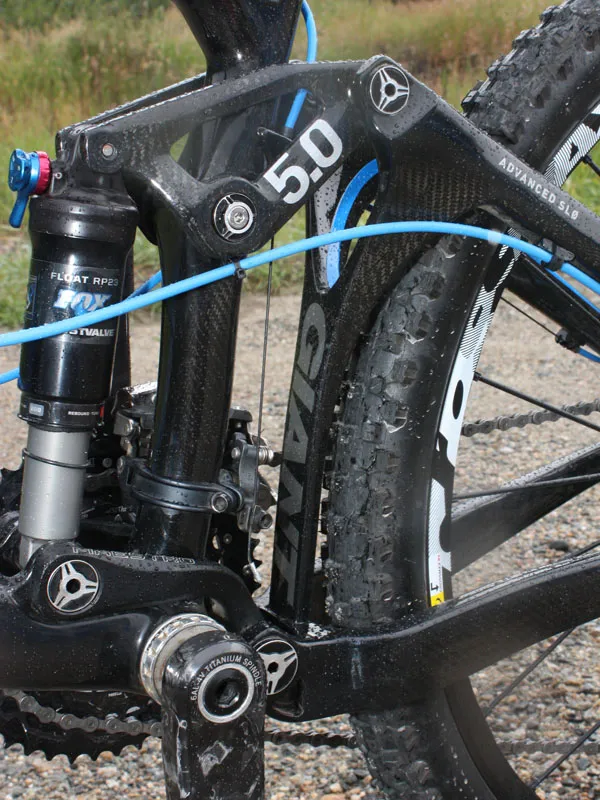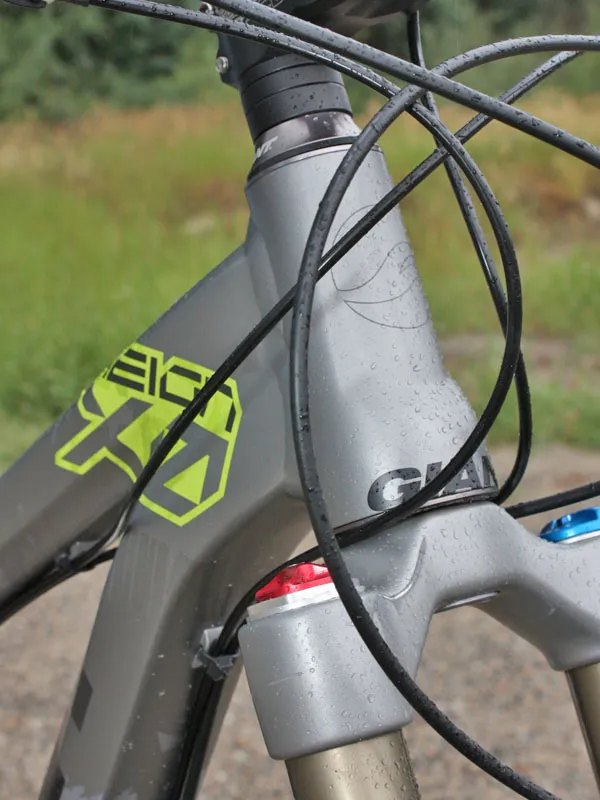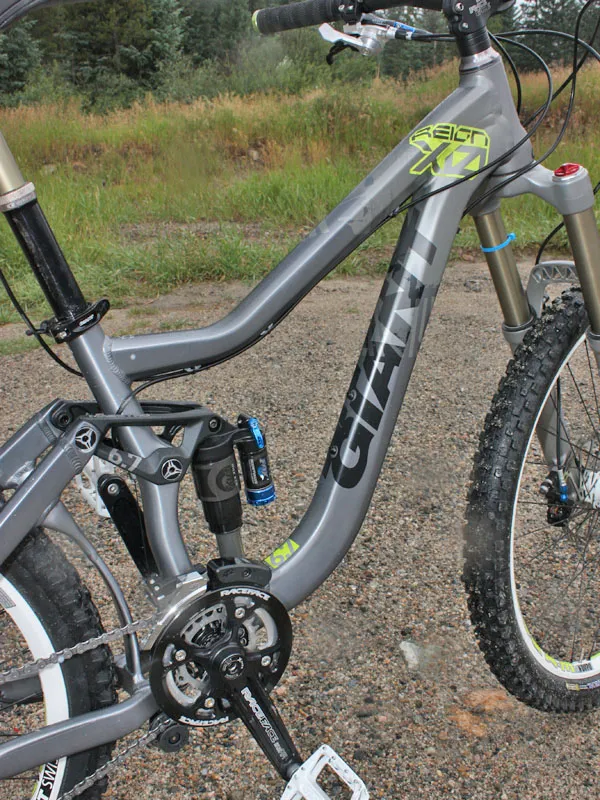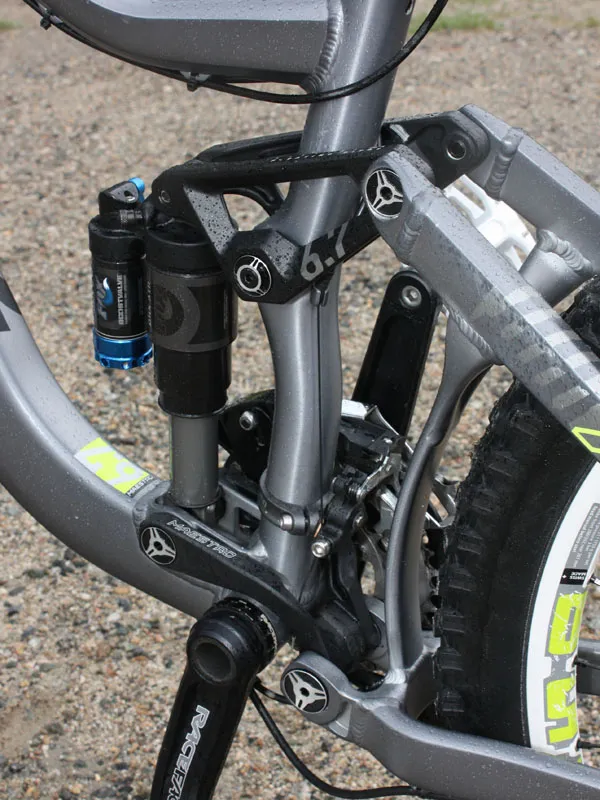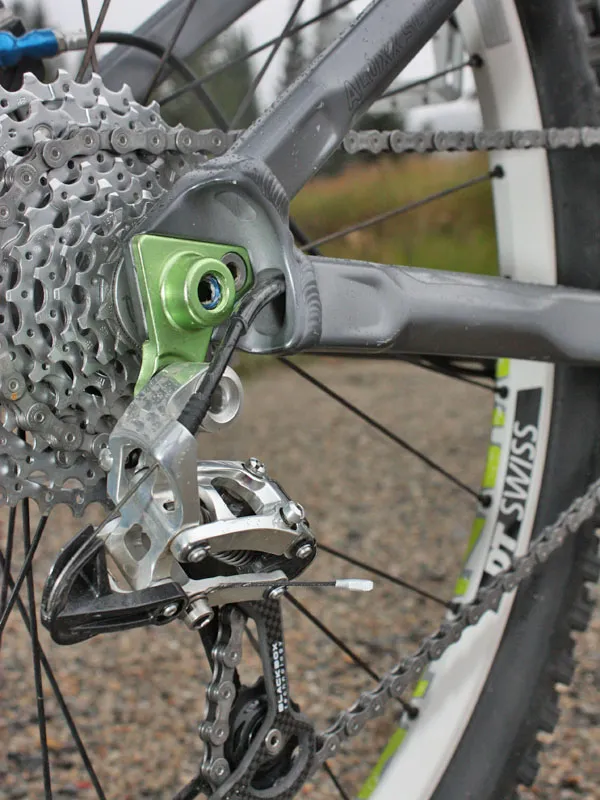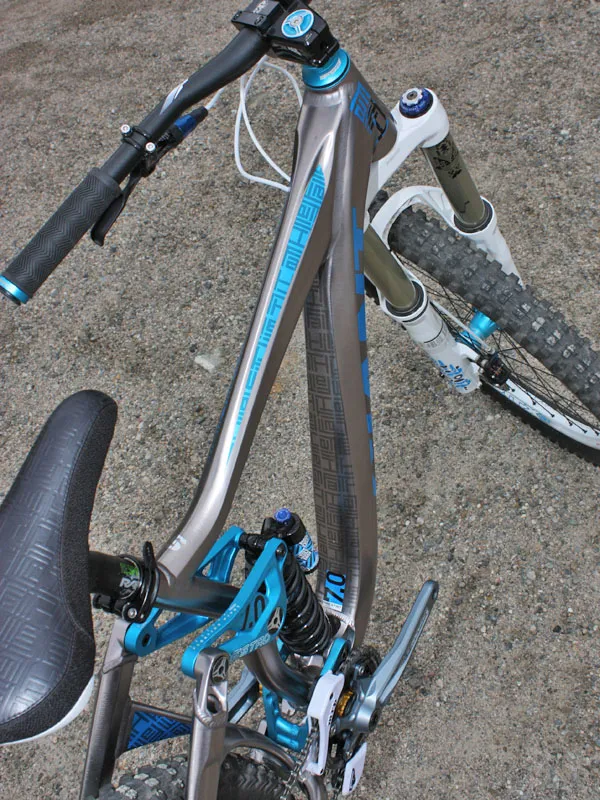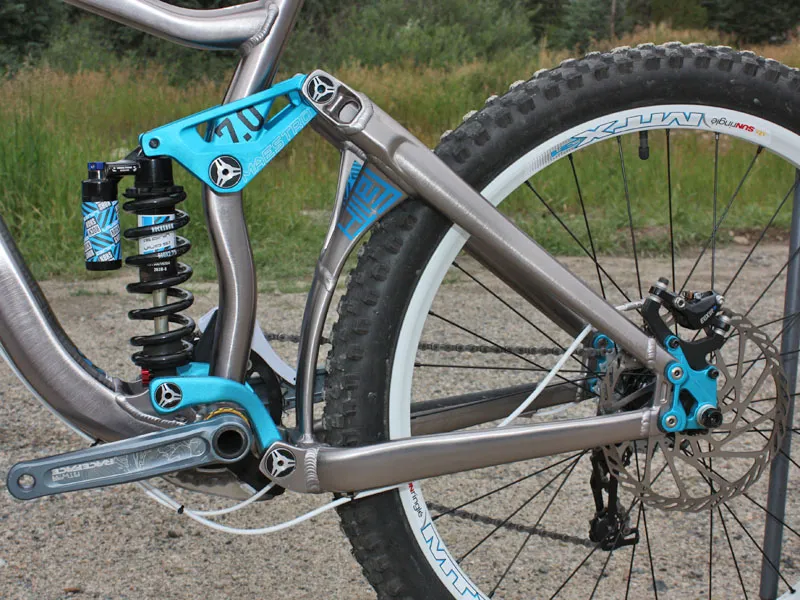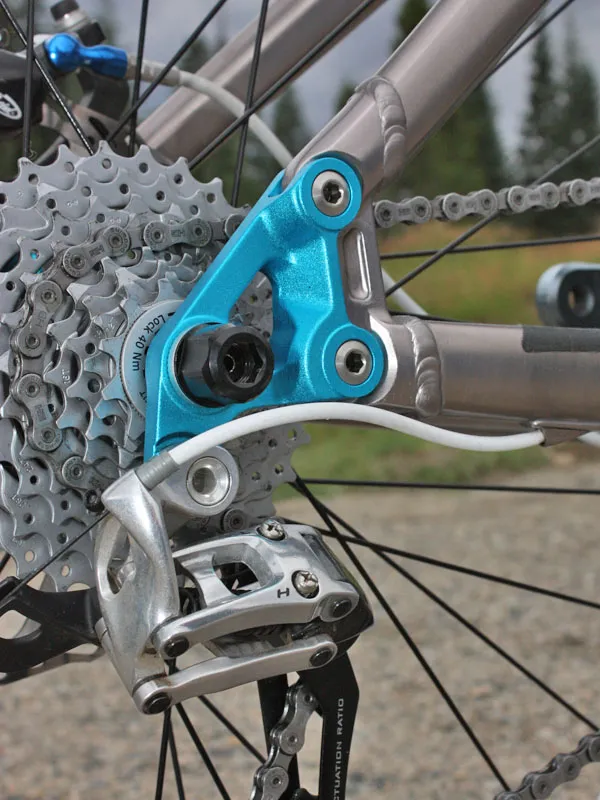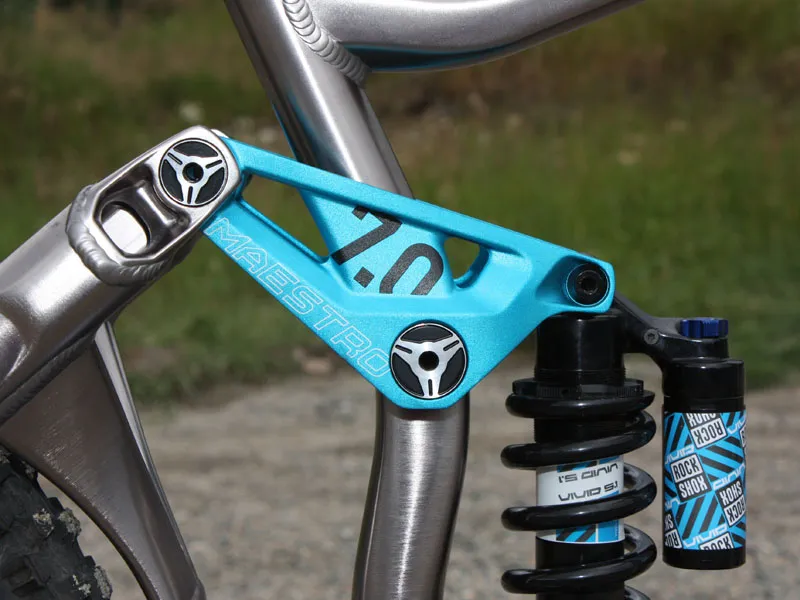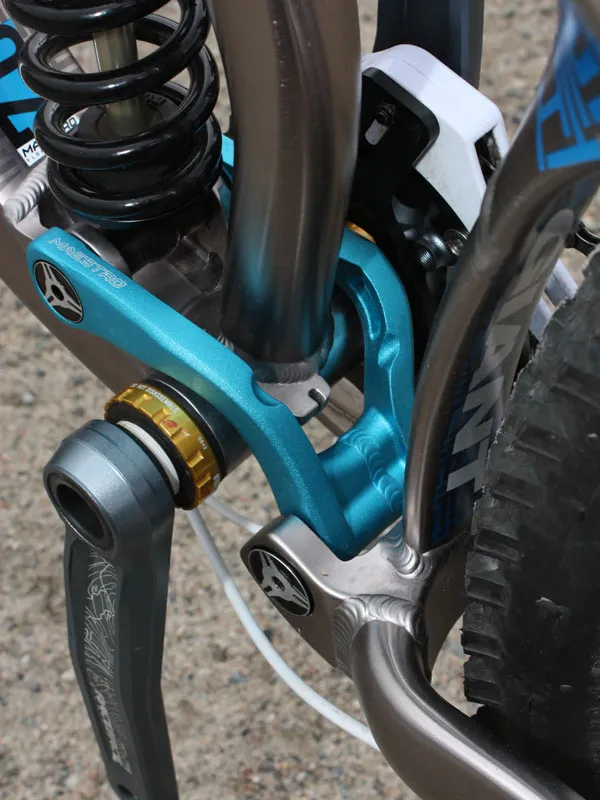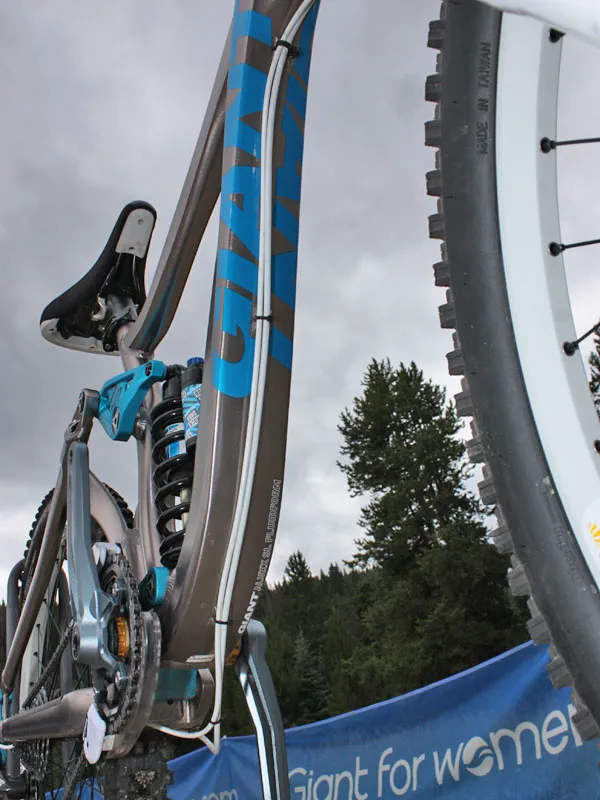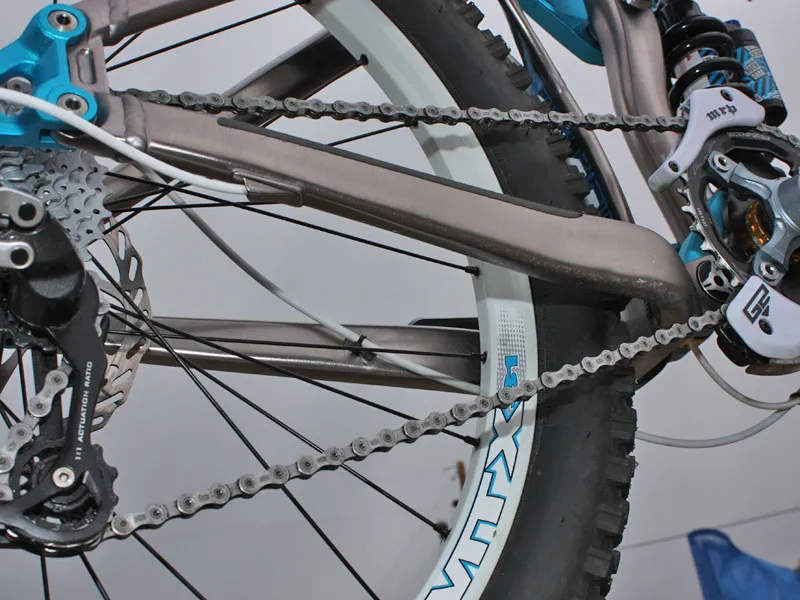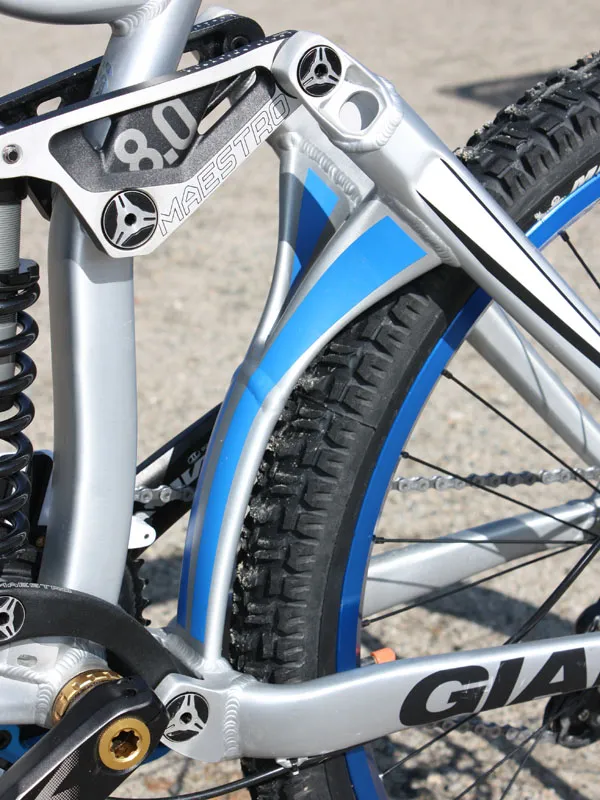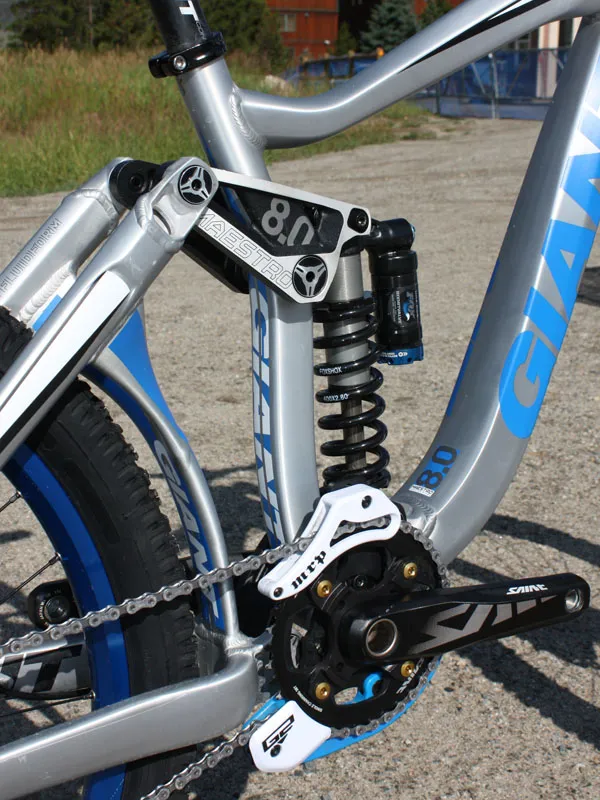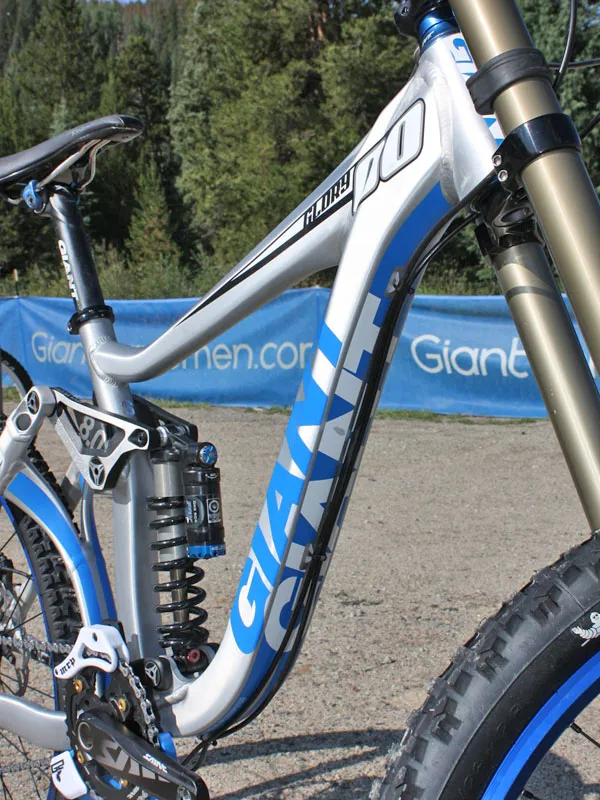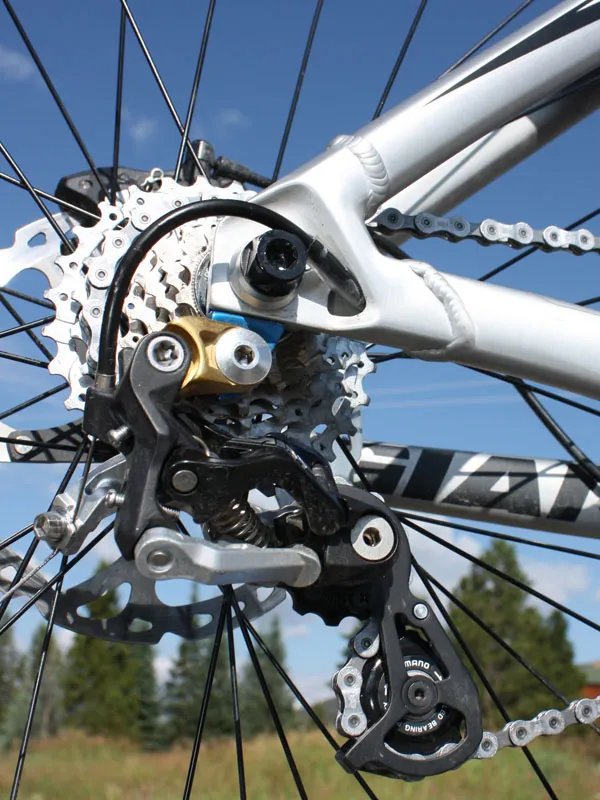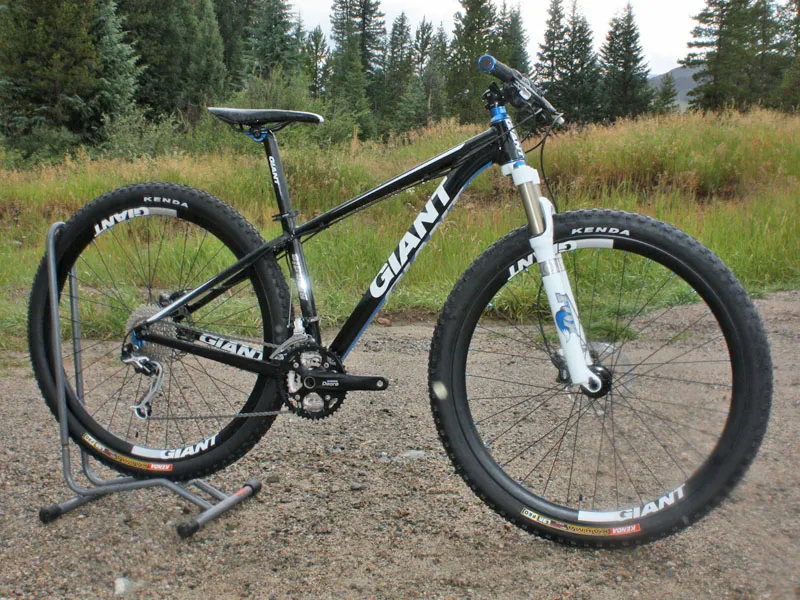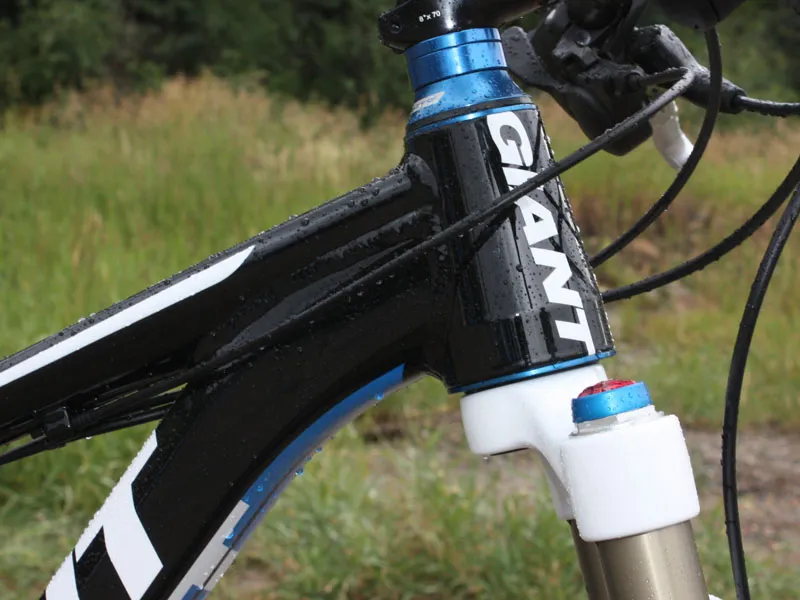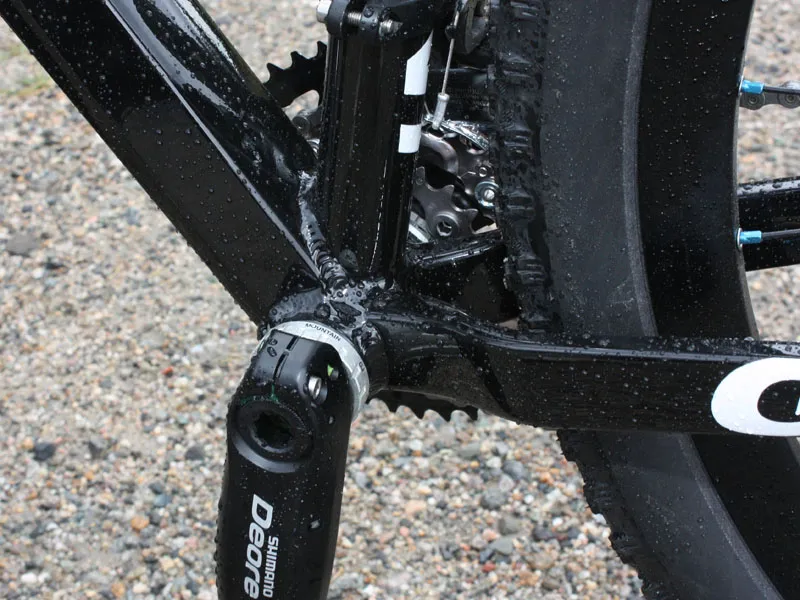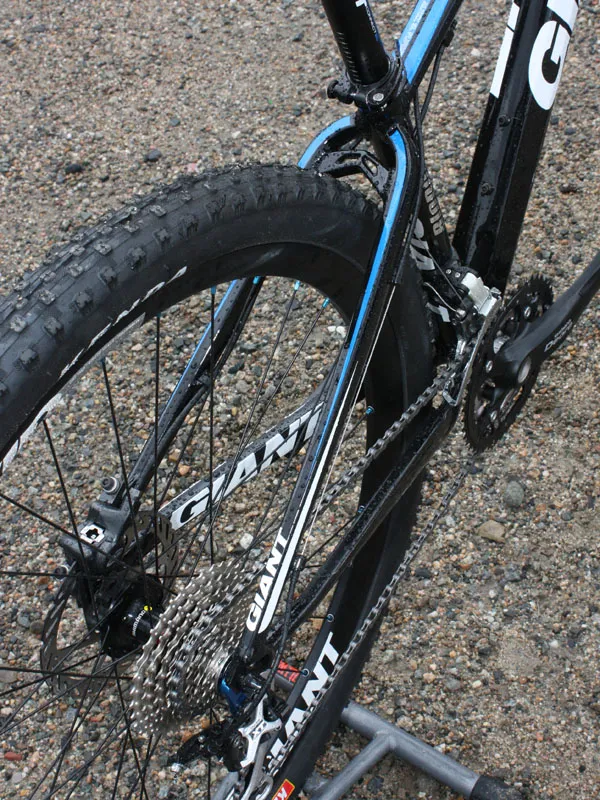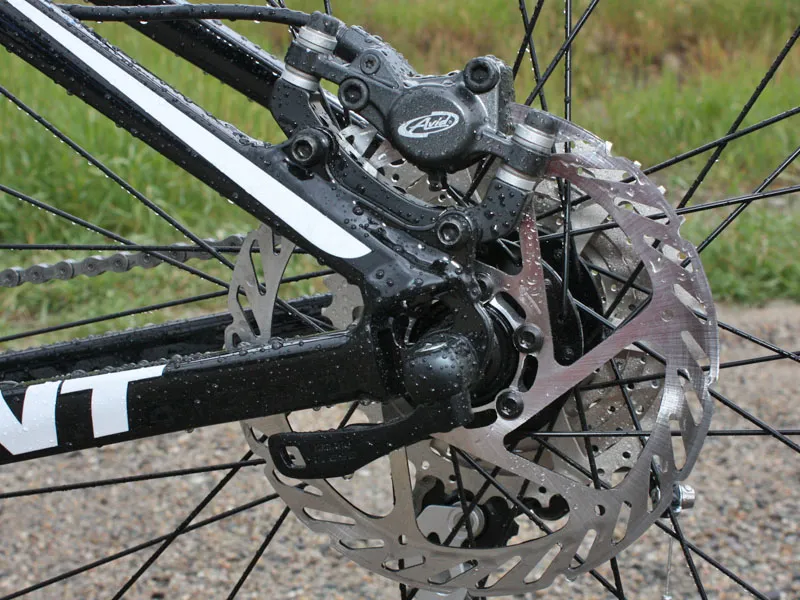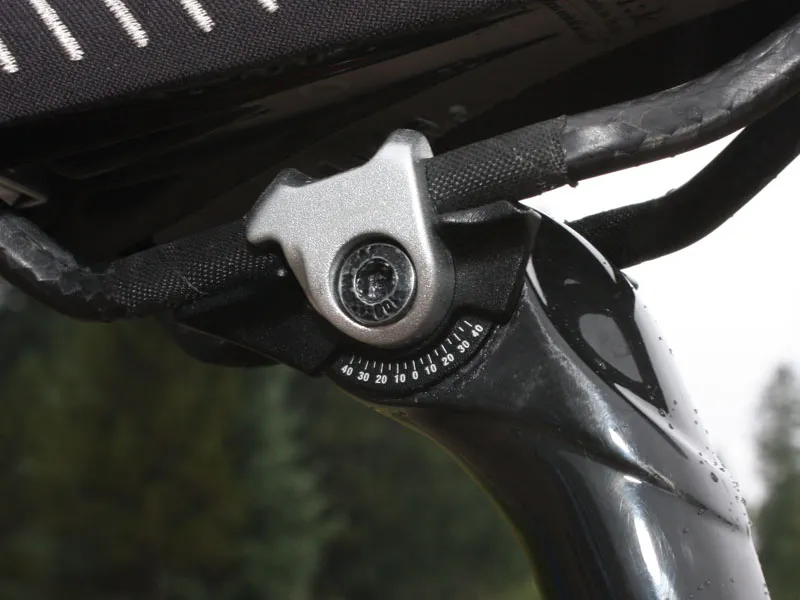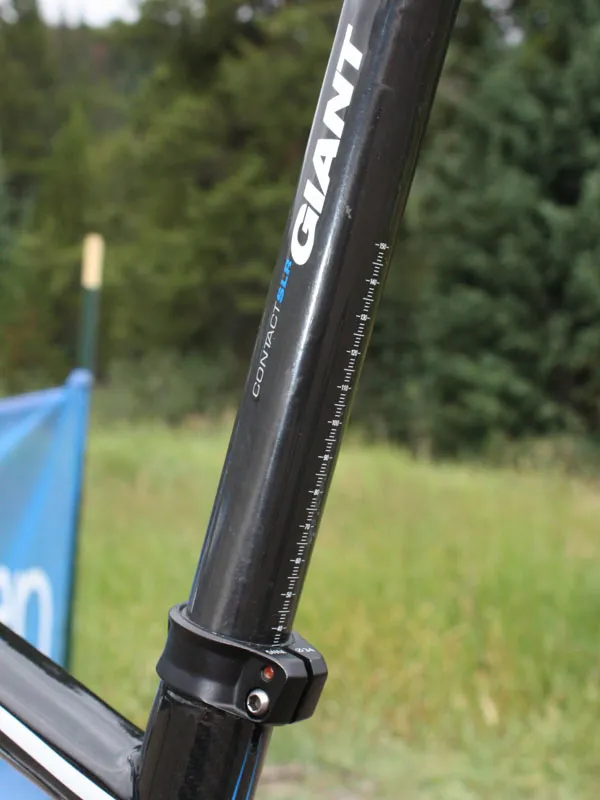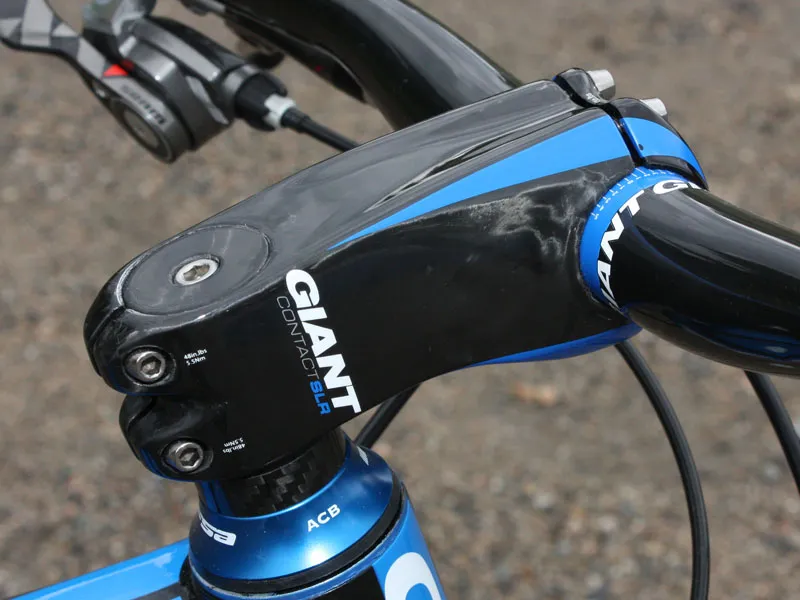Giant's 2010 lineup of full-suspension mountain bikes retains the company's superb Maestro dual-link architecture and geometry but virtually everything is changing. Five all-new frames highlight the new range and bring with them less weight – incredible losses in some cases – equal or better stiffness and improved aesthetics to boot.
Anthem X Advanced SL – Giant's best race bike yet
Topping the cross-country range is team rider Adam Craig's race bike of choice, the revamped 100mm-travel (4in) full-carbon Anthem X Advanced SL. At a paltry 2.1kg (4.63lb) claimed weight for a painted frame with shock and hardware, it's a full 200g (0.44lb) lighter than last year's aluminium Anthem X. Even better, a top-end medium-sized 2010 Anthem X Advanced SL0 built with SRAM's new XX group will peg the needle at an impressive 9.8kg (21.8lb) straight out of the box without pedals.
The production model is actually the fourth prototype that Craig tested and earlier versions were even lighter, with the lightest being under 2kg. However, Craig and Giant ultimately decided that it was worth a bit of extra weight to gain more chassis rigidity.
The front end now boasts an 'OverDrive' tapered 1-1/8in-to-1 1/2in steerer with a correspondingly enlarged 'MegaDrive' rectangular down tube that measures a whopping 205mm in circumference. The top-end SLO model also gets a Giant-exclusive tapered version of RockShox's SID XX, which by itself is claimed to deliver a 25 percent jump in bending stiffness compared to the standard fork.
In addition, the new Anthem X Advanced SL also gets a composite upper rocker arm, new pivot hardware and a slightly narrower outside chainstay width (to take advantage of the narrow Q-factor version of the SRAM XX crank). Geometry is wisely unchanged from last year, with 71/73° head/seat tube angles, short 425mm chainstays and a stable 10mm bottom bracket drop.
New all-carbon Trance X Advanced SL
Giant's 127mm-travel (5in) Trance X trail bike platform gets a new all-carbon version for 2010, the Trance X Advanced SL. The Advanced SL's 2.25kg (4.96lb) claimed frame weight (medium, painted, with shock and hardware) is a full 400g (0.88lb) lighter than the 2009 aluminium version and yet also seven percent more rigid for improved handling and pedalling responsiveness.
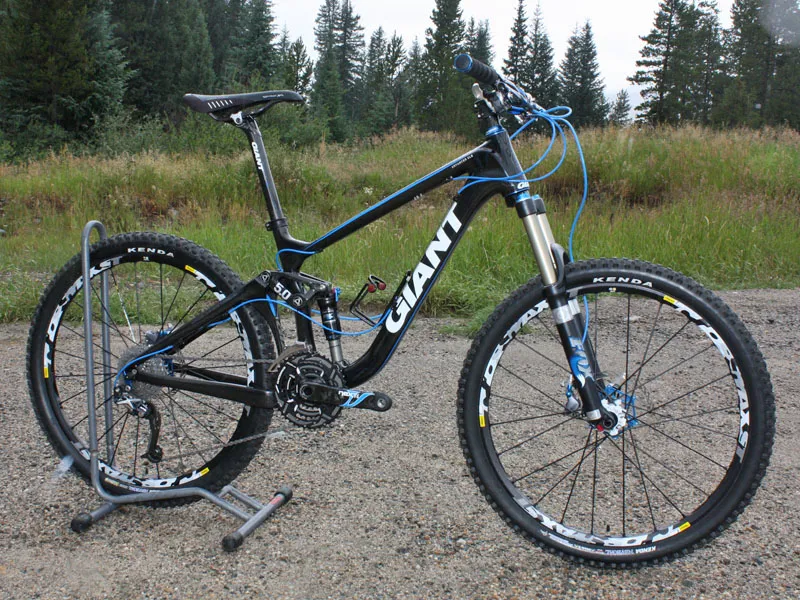
Frame shape upgrades are similar to those on the shorter-travel Anthem X Advanced SL and include the OverDrive tapered front end and a similarly huge MegaDrive rectangular down tube – again over 200mm around.
Frame geometry is also unchanged from last year (69.5/73.5° head/seat tube angles, 435mm chainstay length, 0mm bottom bracket drop), save for one exception: head tube lengths on the large and extra-large sizes have been shortened by 5mm and 15mm respectively, to allow for more handlebar drop.
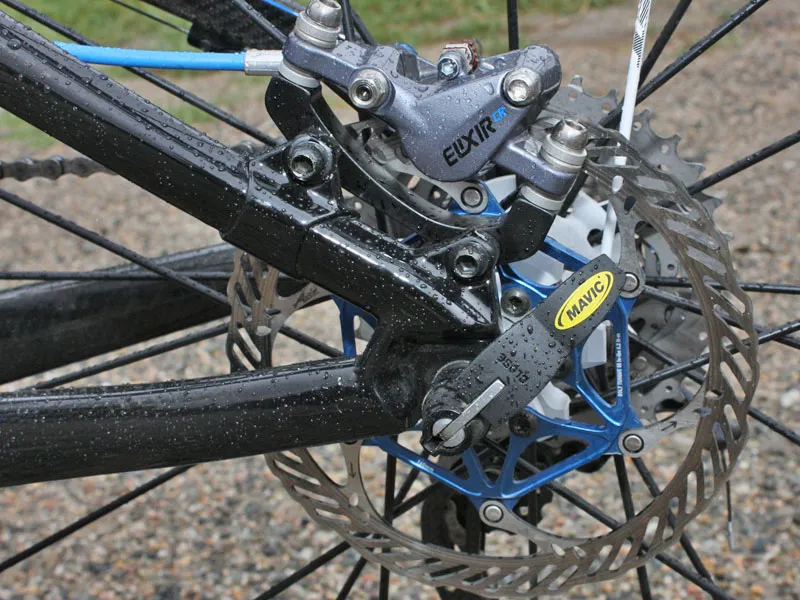
The top-end Trance X Advanced SL0 model will weigh in at a race bike-like 11.1kg (24.5lb) for a medium size without pedals, but it easily could have been lighter. Giant's global mountain bike category manager Kevin Dana felt that middleweight items such as the versatile Mavic Crossmax ST wheels and Fox 32 TALAS FIT RLC fork (with 15mm through-axle dropouts) were better suited to the frame's capabilities than super-light race kit. Lighter and/or smoother riders – or ones who just want to drop weight – could shed another half-kilo without too much trouble to make for an even faster rig.
More 'up' for the all-mountain Reign X
Though the weight losses on Giant's shorter-travel Maestro bikes are impressive in their own right, the crash diets of the longer-travel platforms are far more dramatic.
The new Reign X all-mountain chassis retains its ALUXX aluminum construction and 170mm (6.7in) of travel but careful redesigns have shed a full 675g (nearly 1.5lb) from last year's version – claimed weight for a medium painted frame with a Fox DHX Air rear shock and hardware is now just 3.1kg (6.83lb) and a complete Reign X0 is a very climbable 13.7kg (30.2lb) without pedals.
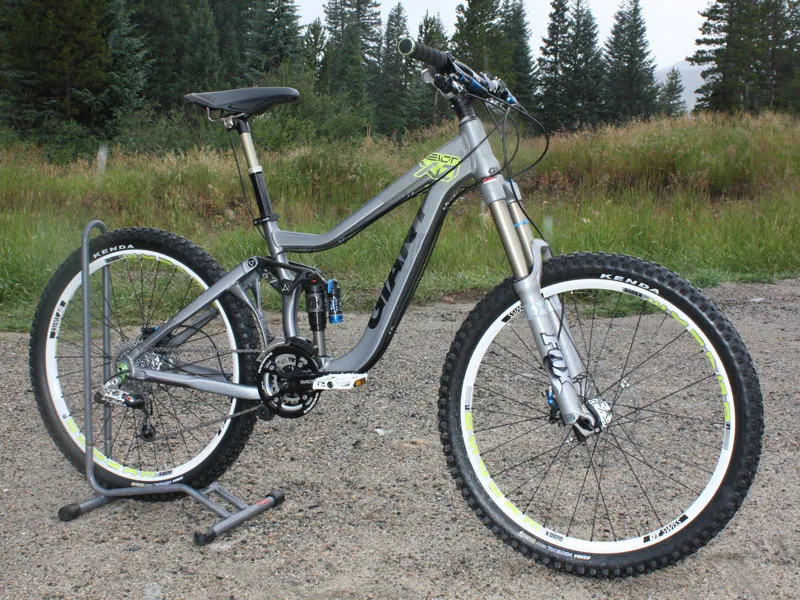
Much of the weight saving comes with the new co-pivot suspension arrangement already in use on the Anthem X and Trance X platforms, whereby the lower shock pivot doubles as the axle for the forward lower link pivot. As a result of the new packaging, last year's hefty pierced down tube configuration can be traded in for a more conventional – and more svelte – setup.
The OverDrive tapered front end and correspondingly bigger down tube make an appearance here as well and also work with the more aggressively hydroformed tubing to yield a five percent increase in stiffness compared to '09.
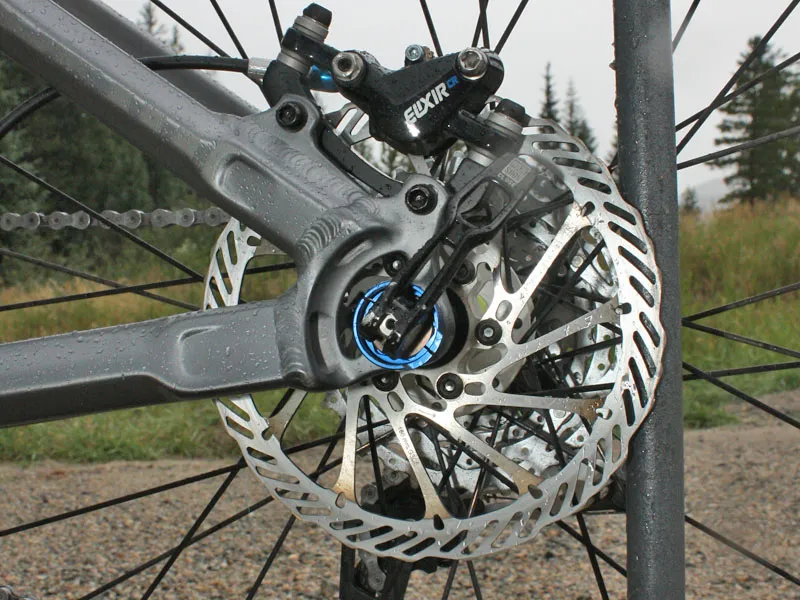
In addition, rear dropouts are now compatible with RockShox's 12x135mm Maxle Lite through-axle, the new down tube-routed full-length housing paths are cleaner and less prone to ghost shifting, and cable guides are included for remote telescoping seatposts. The S-bend down tube even provides enough room for a bottle cage.
Last year's quintessential all-mountain geometry is carried over with 67/72-72.5° head/seat tube angles, 440mm chainstay lengths and a -13mm bottom bracket drop (meaning the bottom bracket sits higher than the hub axles).
Giant bring back the dedicated freeride bike
Huckers will be pleased to note the resurrection of a dedicated freeride bike from Giant for 2010 instead of last year's somewhat compromised Glory. The Faith nameplate returns after a three-year hiatus with a slightly shorter 177mm (7in) of travel, and geometry and handling purpose-built for spending as much time in the air as on the ground.
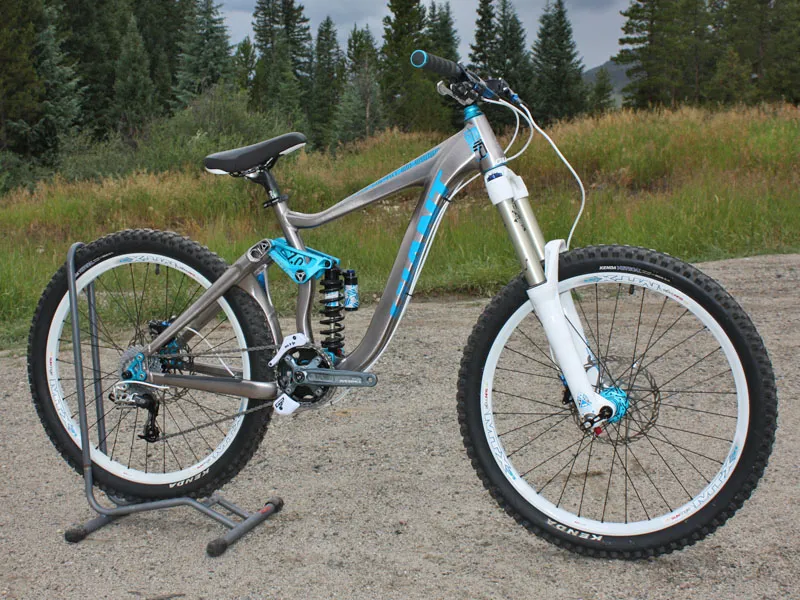
Although reducing weight isn't quite as important here as with more pedalling-orientated segments, a lighter bike still makes for a machine that's easier to control in the air, more eager to change direction and quicker to slow down, and the Faith certainly doesn't disappoint in that area. At a claimed weight of 4.06kg (8.95lb) for a painted frame with coil Fox rear shock and hardware, the Faith sheds an almost unbelievable 1.1kg (2.43lb) from last year's Glory and a complete medium Faith 0 is 16.7kg (36.8lb) without pedals.
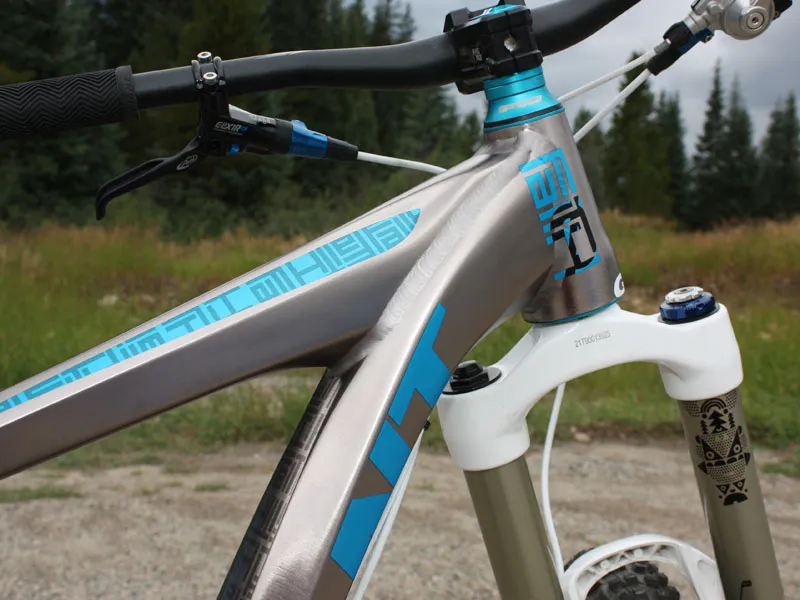
An OverDrive front end, co-pivot Maestro suspension layout and huge hydroformed aluminium down tube and top tube make their way here as well and help make for a seven percent stiffness increase over the last-generation Faith (which was far heavier). Convertible 12mm rear dropouts will work with standard, Shimano Saint or Maxle through-axle setups, and will also allow for either a 66.75° or 66.24° head tube angle (and corresponding changes to chainstay length and bottom bracket height) to fine-tune the handling.
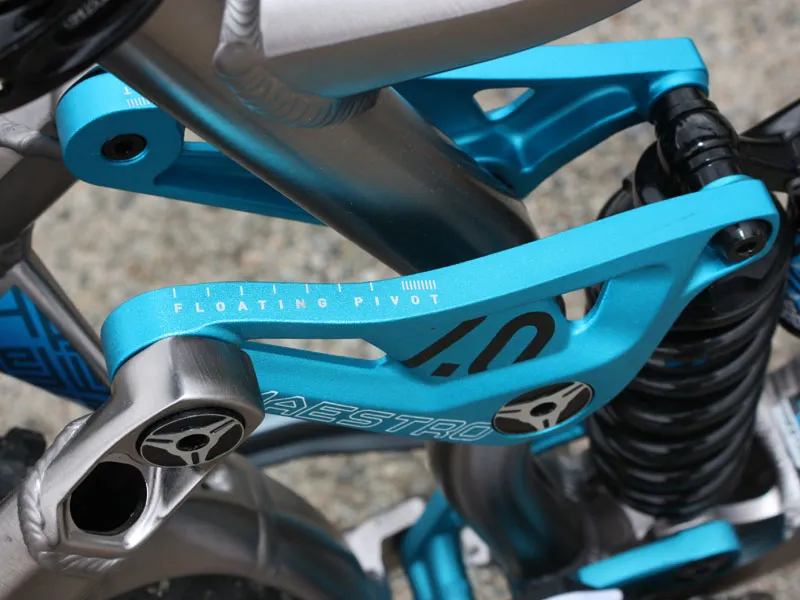
Finally, full-length housing will run along the down tube for better long-term shift performance and a cleaner appearance, and a standard 73mm-wide bottom bracket shell (with ISCG05 tabs) will allow for a wide range of drivetrain setups.
Glory downhill bike gets leaner and faster
Giant readily acknowledge that though their 2009 Glory DH was an excellent – and very popular – downhill performer, it was massively heavy (or as Dana puts it, "it was an overbuilt tank"). After nearly two years of development and refinement work on the 2010 version, the result is an unreal 1.5kg (3.3lb, or 26.8 percent) weight loss.
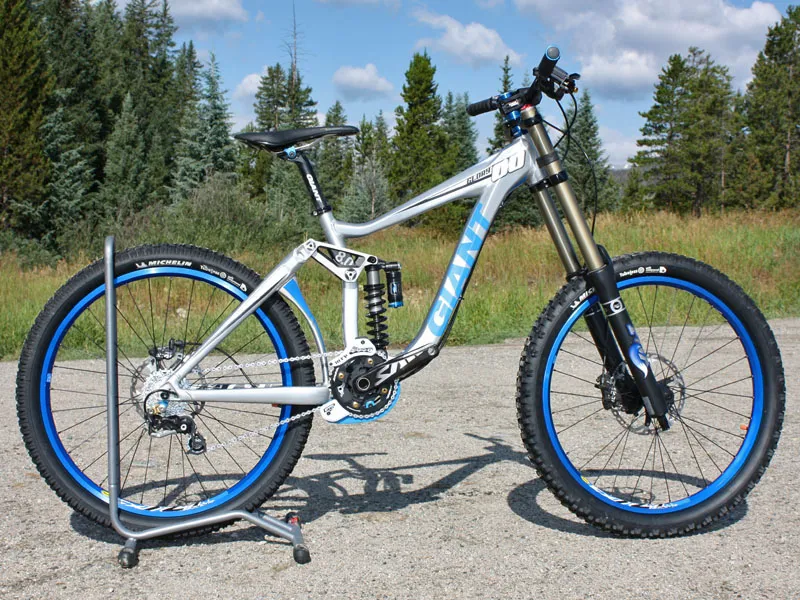
Claimed weight is now a much more competitive 4.06kg (8.95lb) for a medium painted frame with rear shock and hardware, while a complete Glory 0 model is a feathery (for a downhill bike) 17.19kg (37.9lb) while retaining the same stiffness as last year. That's akin to a 70kg (154lb) rider losing nearly 19kg (42lb) overnight and it doesn't take a brain surgeon to envision the changes in handling dynamics that result. Travel actually decreases to 203mm (8in) from last year's 224mm (8.8in) but Giant claim it's the right amount for the job at hand, stressing quality of travel over quantity.
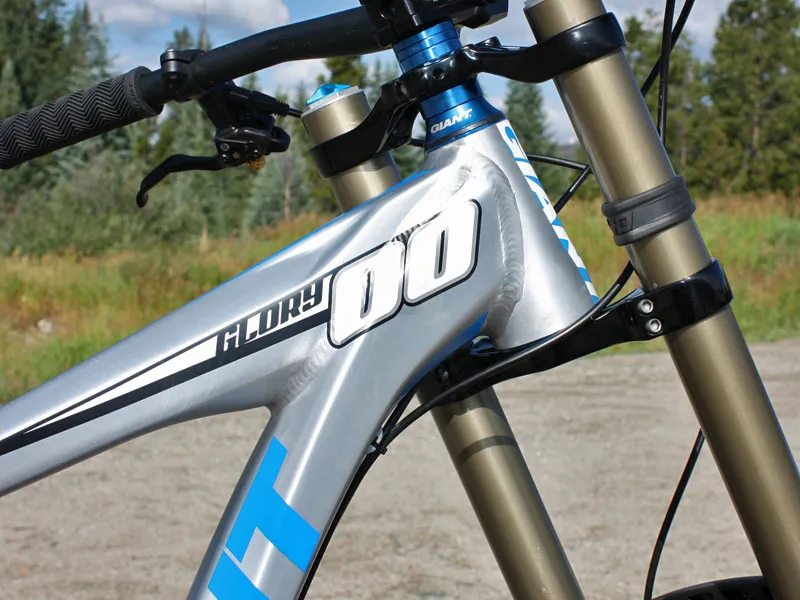
Last year's OverDrive tapered front end carries over but the suspension layout now gains the co-pivot arrangement as with the rest of the line, along with completely overhauled hydroformed tubing shapes. Convertible rear dropouts can be configured to work with standard 12mm, Shimano Saint or RockShox Maxle through-axles, the 83mm-wide bottom bracket shell (with ISCG05 tabs) offers a straighter chainline with wider downhill-style hubs, and new down tube-routed cables are cleaner-looking and less prone to ghost shifts under heavy impact.
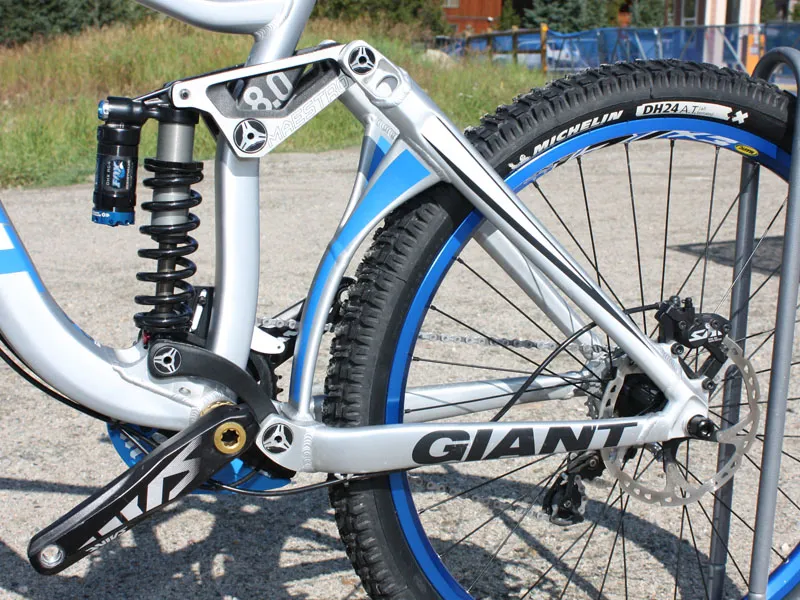
As with the rest of the revised 2010 lineup, frame geometry on the new Glory is mostly carried over from the previous version's proven setup, including a 65.5° head tube angle, relatively short 445mm chainstays and a -24mm bottom bracket drop. The only significant change is with the medium frame size, whose top tube is now 37.4mm longer than before to take a more logical in-between position relative to the small and large.
New component line for 2010
Giant will also devote some attention to new componentry for 2010 that will include the usual bars, stems and seatposts but also wheel bits such as hubs and rims. Four lines will be offered in total, topped off by the carbon fibre Contact SLR range.
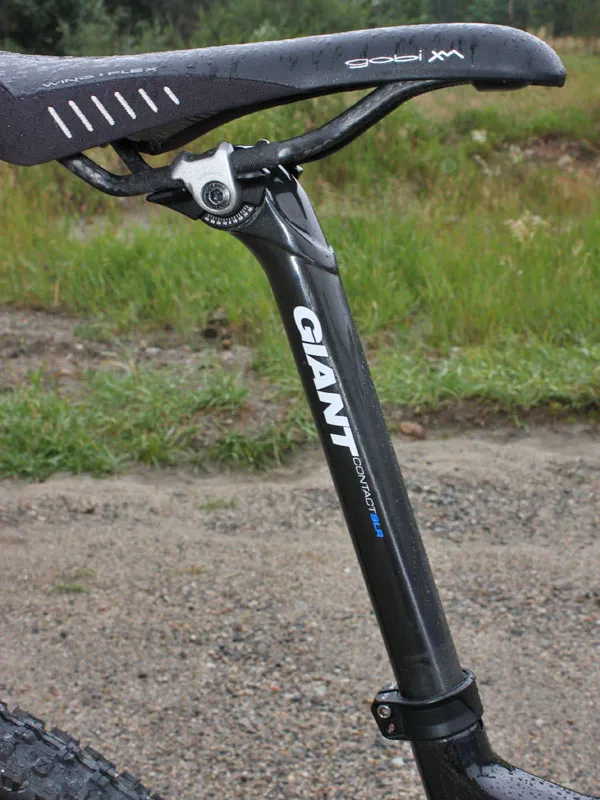
The Contact SLR seatpost weighs as little as 190g in a 375mm length and features a one-piece carbon mast and head. The stepless rotating aluminium clamp offset is adjustable from 12-23mm and the lower cradle is 55mm long (and reversible) to support lightweight rails. Alternate clamp bits will be available for taller carbon rails.
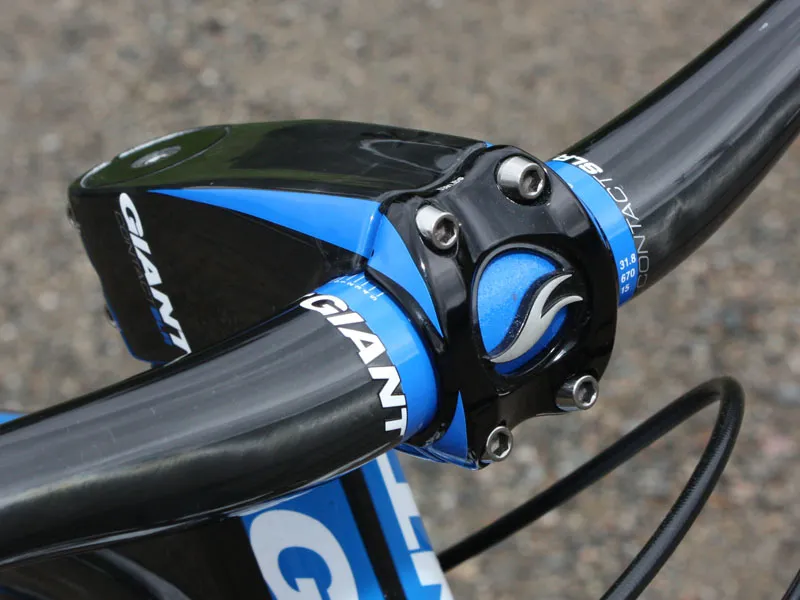
The Contact SLR moulded carbon fibre stem is similarly feathery at 125g for a 100mm length complete with a forged alloy four-bolt faceplate and titanium hardware. A neat semi-recessed design keeps the included carbon fibre top cap flush with the rest of the stem surface for a cleaner look, and stack height is a tidy 40mm.
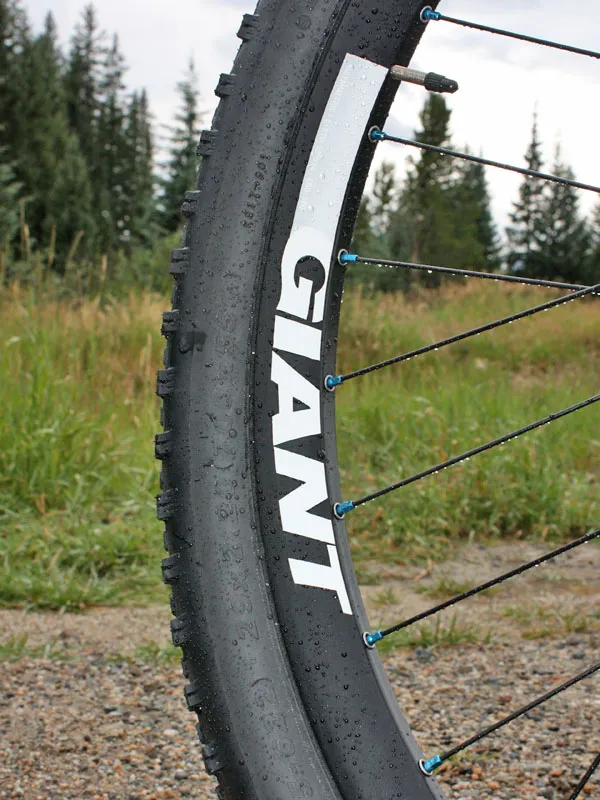
The Contact SLR range will also include three all-new carbon mountain bike handlebars: a bar-end compatible 125g flat bar with a 5° sweep and 620mm width; a 165g 15mm riser with 9° of backsweep, 5° of upsweep and a 670mm width; and a 175g 19mm riser with the same angles but a more generous 690mm width.
So how do the new bikes ride?
The relatively short launch format didn't allow for quite enough time to sample all of Giant's new wares (and the Anthem X Advanced SL rocket ship wasn't available to ride) so we spent most of our time on the Trance X Advanced SL and Reign X0, and the trails in and around the ski resort of Keystone, Colorado.
Giant tout the Trance X Advanced SL as 'the ultimate go-to bike' for mixed-terrain riding involving equal parts climbing and descending, and our test loop suitably included a 600m (2000ft) uphill slog before jumping onto the famed Colorado Trail for a fast semi-technical descent back to the base. As we've come to expect from Giant's dual-link suspension design, pedaling efficiency was superb – even with the Fox RP23 rear shock's ProPedal platform turned off – and the feathery weight of the new carbon chassis made the journey noticeably less painful.
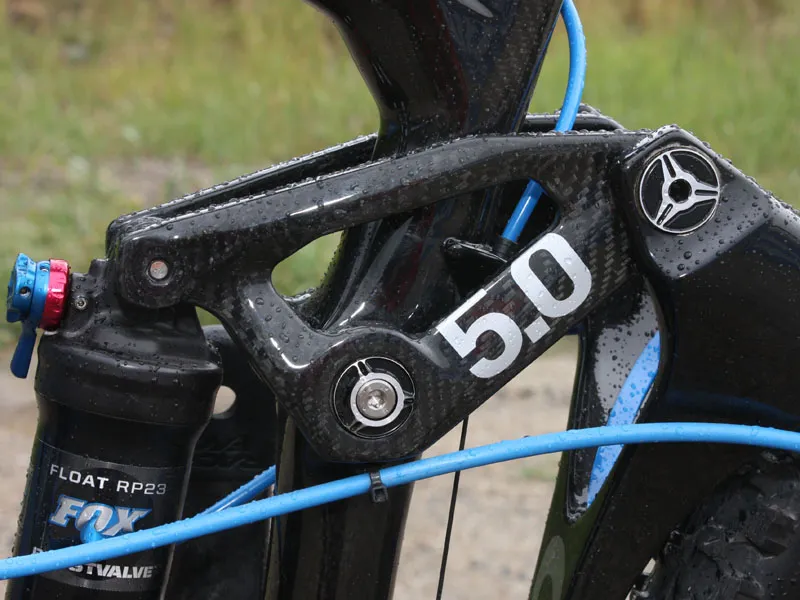
The new Trance really showed its mettle once we finally headed downhill though, with sharp handling owing to the newly tapered front end and stout front triangle. Suspension movement was well controlled across a wide variety of bump sizes, with a taut, springy feel throughout the travel range and no mid-stroke wallow. Good stuff all around for a first taste and a good indicator of what's to come long-term.
Transition to lift-accessed trails and the new Reign X0 showed similar benefits, in particular the stiffer and more accurate-handling front end plus the excellent traction of the Maestro rear end. The stock single-ply Kenda tires were perhaps a bit too light for Keystone's rocky terrain (we got three flats on one run before swapping to downhill tubes and increasing tyre pressure) but to be fair, the Faith or Glory probably would have been better tools for the job. Even so, the Reign comfortably handled some of the area's toughest terrain – including a nice 2m (6ft ) drop – and still pedalled quite well back to the lift base.
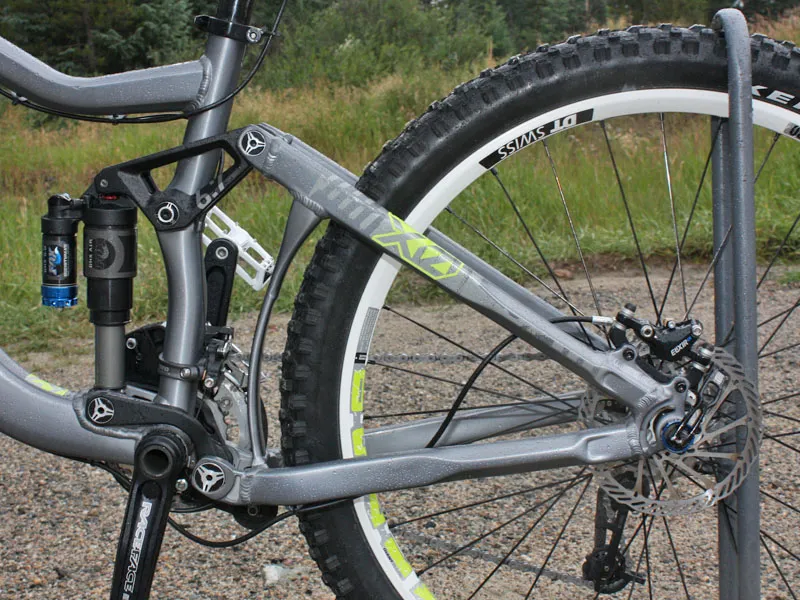
All in all, we like what we see from Giant for 2010 and it's a pleasant surprise to see so many upgrades applied to so much of the line in a single model year. As long as Giant's engineers have managed to retain (or improve upon) the 2009 bikes' durability, things are looking good when these new models become available later this year.
Projected pricing is as follows:
Anthem X Advanced SL0: US$7,800 (approx £4,660)
Anthem X Advanced SL1: $4,950 (approx £2,960)
Trance X Advanced SL0: $6,800 (approx £4,070)
Trance X Advanced SL1: $4,950 (approx £2,960)
Reign X0: $5,650 (approx £3,380)
Reign X 1: $3,600 (approx £2,150)
Reign X 2: $2,250 (approx £1,350)
Faith 0: $4,125 (approx £2,470)
Faith 1: $3,100 (approx £1,850)
Glory 0: $5,350 (approx £3,200)
Glory 1: $4,125 (approx £2,470)
